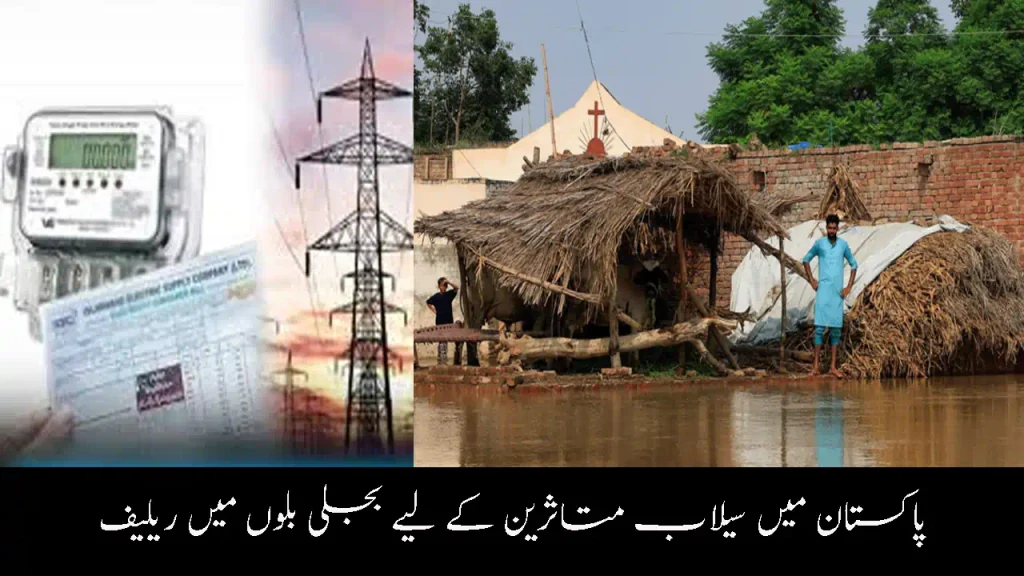Electricity Bill Relief for Flood Victims in Pakistan | Owais Leghari s Announcement

Introduction
In a major step to support communities affected by devastating floods, the Federal Minister for Energy, Owais Leghari, has announced a relief package that will ease electricity bill payments for flood-hit households. The announcement comes at a time when many families are struggling to rebuild their lives while also bearing the burden of rising living costs.
The relief package not only provides extensions on bill payments but also ensures that electricity pricing remains manageable for low-consumption households. This move highlights the government’s dual approach: offering immediate relief to disaster-affected families while also addressing long-term changes in the country’s energy consumption patterns.
Relief in Electricity Bills for Flood-Affected Families
Bill Payment Extensions
For households in areas hit hardest by floods, electricity bills will not have to be paid within the usual deadlines. Instead, extensions will be provided, giving families more breathing space to prioritize their urgent needs.
Financial Support Through Discounts
The government has also confirmed that consumers in affected regions will receive discounted bills as part of the relief effort. This step is meant to ensure that no household is forced to choose between essential living costs and electricity during the recovery phase.
Electricity Discounts for Millions of Consumers
While flood victims receive immediate support, a broader policy is already helping a large portion of the population. The minister revealed that around 18 million consumers—nearly half of Pakistan’s electricity users—are already benefiting from 70% lower electricity bills.
How is this possible?
- Many households consume less than 200 units of electricity per month.
- The government has introduced subsidies and special discounted rates for such users.
- With solar energy becoming popular, many families are shifting away from heavy grid consumption.
This combination of subsidies and renewable adoption has made electricity cheaper for millions.
Solar Energy and the Rise of Net Metering
Growing Adoption of Solar Panels
In recent years, more Pakistani households have turned to solar power. By installing solar panels, families not only reduce their dependence on the national grid but also bring down their monthly bills. In many cases, people have managed to keep their usage under 200 units per month, qualifying them for special discounts.
Understanding Net Metering
Net metering is a system where people who generate extra electricity through solar panels can send it back to the national grid. In return, they receive credits on their bills.
- For solar users: This system is highly beneficial as it can bring electricity costs close to zero.
- For the government and grid system: It presents challenges because maintaining the grid infrastructure requires funds. If too many people move to solar, the burden of maintenance shifts to the rest of the consumers.
The minister pointed out that net metering could result in an extra cost of Rs. 4 per unit for other consumers, as the financial balance of the system changes.
Why is Electricity Cheaper for Some Households?
There are two main reasons behind the lower bills:
- Government Subsidies: Special programs that reduce bills for households consuming less than 200 units.
- Solar Power Adoption: With solar panels producing a portion of household electricity needs, grid demand decreases significantly.
Together, these factors have contributed to cheaper bills for millions, even while global energy prices remain volatile.
Challenges in Energy Pricing
While these measures provide relief, the government faces difficult decisions:
- How to maintain grid infrastructure while more people shift to solar.
- How to ensure fair pricing so that solar users do not unfairly reduce their share of grid costs.
- How to balance short-term subsidies with long-term sustainability in the energy sector.
These questions will shape Pakistan’s electricity future in the coming years.
Frequently Asked Questions (FAQs)
Who will benefit from the flood relief package?
Flood-affected households will receive extended deadlines and special discounts on their electricity bills.
How many people already pay discounted bills?
About 18 million consumers are enjoying 70% lower bills, thanks to subsidies and low consumption.
What does it mean to consume under 200 units?
Households that use fewer than 200 units per month qualify for special discounted electricity rates.
How does net metering work?
Solar panel users can send unused electricity back to the grid and receive credits on their bills, reducing costs.
Will electricity become more expensive in the future?
It depends on how the government balances solar adoption, subsidies, and the cost of maintaining the national grid.
Conclusion
The relief measures announced by Federal Minister Owais Leghari are a welcome step for flood-affected families, ensuring they are not overburdened during a period of hardship. At the same time, Pakistan’s energy sector is undergoing a major transformation—with millions moving toward solar energy and the government working to keep electricity affordable.
The challenge ahead lies in finding a balance: supporting renewable growth while making sure that electricity pricing remains fair and sustainable for all citizens.
Read this: 2nd Year Result 18-09-2025 | Check Class 12 Result Online
Read this: Gold Price in Pakistan Jumps by Rs. 1200 Per Tola






